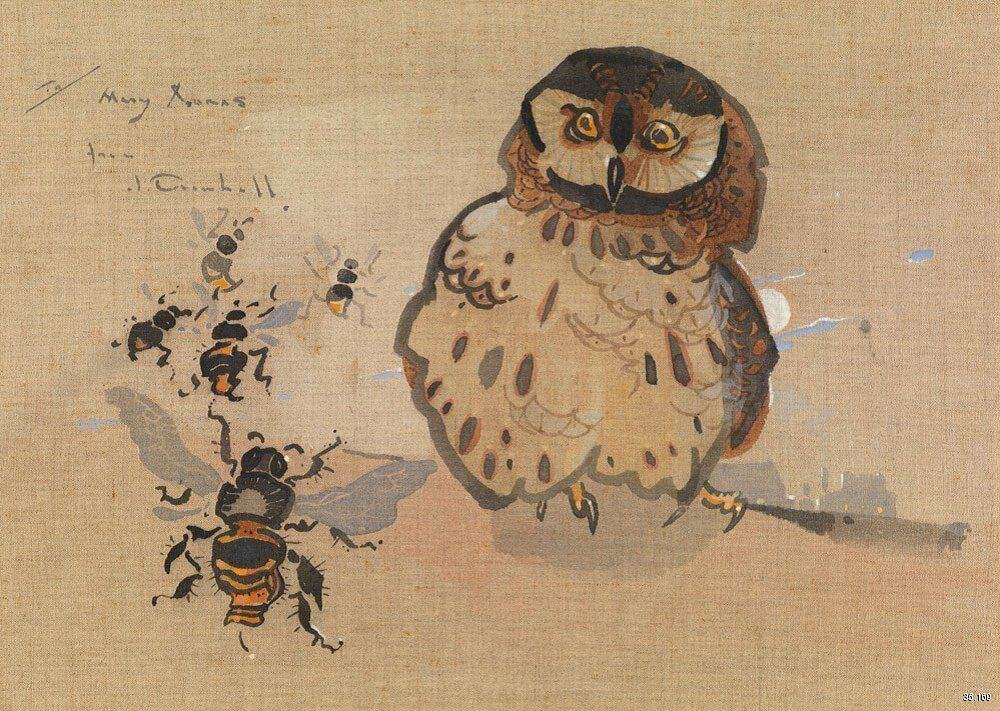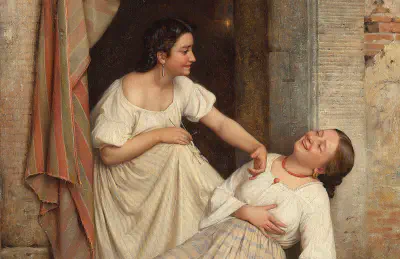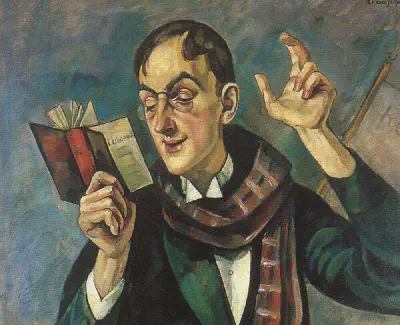Welcome to our Season Two Looking for Wisdom Course
Birds do it. Bees do it. And according to Cole Porter, even educated fleas do it (although I’m not quite so sure). But what is this thing called love? What does it mean to fall in love? And why does love loom so large in our individual and collective lives?
Welcome to season two in our Looking for Wisdom course series, where we’re going to be exploring the philosophy of love. Over the coming seven weeks, we’re going to be trying to make some sense of what is one of our deepest—and often most confusing—human preoccupations.
Love songs
Human beings have always been obsessed with love. One indication of the depth of this obsession is in the number of songs that testify to the varieties of human love. Love songs seem almost universal. Here’s an example from ancient Sumer, around 4000 years ago, written by a woman to her lover:
Man, I will ply you with charm. My treasure, I will bring you honey, in the bedroom oozing honey. Let us enjoy your charm. Darling, I will ply you with charm. My treasure, I will bring you honey.[1]
Over in China, the Shi Jing or Book of Songs contains many songs about love, lust, and everything in between. One example is this song about a lover who has a date with a certain Zhongzi, who seems determined to lustily vault over the fence into the lover’s garden, even at the risk of causing trouble.
Please, Zhongzi, Don’t climb into our garden, Don’t break the spindle trees we have planted. Not that I am concerned with them, I am afraid of what people say. I love you, Zhongzi, But I am afraid Of what people will say. [2]
And one of my favourites is this entertaining gem from India, in the anthology of love songs called the Gāhā Sattasaī. In this song, a woman is dousing the flames as her house burns; but the kindling of the flames of love gives her hope not all is lost:
Even though everything I had went up in flames I am overjoyed, For during the fire It was he who took the bucket of water From my hand into his. [3]
And a couple of thousand years later, we’re still at it. Things fall apart, Miley Cyrus reminds us. And nothing breaks like a heart. Throughout human history, the sheer amount of energy that has been put into falling in love, falling out of love, renouncing love, embracing love, arguing about love, worrying about love, thinking about love, writing about love and singing about love is staggering.
There’s something going on here, something that is ripe for philosophical discussion. But what?

Biological machines and social roles
One thing that makes love hard to pin down is that although love seems to be a human universal, it looks very different in different contexts.
In her book What Love is, and What it Could Be, philosopher Carrie Jenkins writes that love is “ancient biological machinery embodying a modern social role” [4]. When we fall in love, there is real biological stuff going on. And if we (and the birds and the bees and the educated fleas) all do it, the reasons for this are rooted in our biology and our evolutionary history. We get turned on. We lust. We desire. We navigate complex webs of trust and affection. Irreducibly social animals, we snuggle and cuddle and seek the company of others whom we like. This is what we were made for.
Because of this shared biological heritage, we feel we can understand when a singer in ancient Sumer sings about being in the bedroom oozing honey. We get what is going on when the lusty Zhongzi tries to vault over the fence. We smile, as the ancient Indian poet may have smiled, at the image of the woman dousing the flames as her house burns, and finding her heart leap in her chest as she is passed a bucket of water by the object of her affections.
But love in is not straightforwardly biological. Although we get the Indian love song, we perhaps don’t get it in quite the same way an Indian reader might. The meanings we give fire are not quite the same that the ancient Indian poet gave them. And the meanings we give love are not the same either. So alongside all our biological commonalities, if we want to make sense of human ideas of love, we need to take account of human malleability. The forms love takes, the meanings we give it, the ways in which we understand it, are all fashioned by the cultures of which we are a part. Love is culture and biology.
Of course, this combination of ancient biological machinery and modern social roles is not unique to love. It is an instance of a broader anthropological truth about the way biology and culture intersect. Many aspects of human life—justice, friendship, family—can only be understood if we take account of both social and cultural roles and our underlying biological machinery. And this is one reason why, in our search for philosophical understanding, it pays to take a broader perspective, rather than relying on the insights of one culture or one tradition.
This is certainly the case when it comes to love. Philosophical discussions of love are often rooted in Greek and European traditions. But they tend to pay less attention to traditions from elsewhere. So in this course, I want to try something different. In our quest for understanding what love is, we’ll be going further afield. We’ll be exploring notions of love in Greece and India, in the philosophical cultures of sub-Saharan Africa, and in the rainforest cultures of Amazonia. Because only when we see how the same biological themes are transformed by endlessly inventive cultural variations, can we start to understand the complex territories of human love.
Messy love, and philosophical housekeeping

There’s something messy about love. And the messiness is part of the reason for our fascination. Love is hard to pin down, hard to get a handle on. Human love seems such a slippery kind of thing that it gives rise to endless confusion and uncertainty.
For some philosophers—those for whom the primary task of philosophy is clearing up conceptual confusion—the temptation when confronted by this kind of mess is to come bustling in with brushes and brooms to start tidying things up. And this might seem at first glance to be a good thing. Who likes undue confusion? But if you want to understand the mess of human life, you admit the philosophers into your house at your peril. Once they have tidied things away, moved around the furniture, and conjured ingeniously rational systems for filing all those bits and pieces that you have lying around, things may certainly seem tidier. Everything may look sparkling and new, the lines of argument clear. But once the philosophers have done their work, it can sometimes also be hard not to feel slightly less at home. Philosophical accounts of human existence can be like those idealized show-homes you sometimes see: well-tended, meticulously thought-out, but ultimately not very liveable. And when it comes to philosophical accounts of love, if there is too much clearing away of the everyday human mess, along the way it is hard not to feel that something has been lost.
Living with (a modicum of) mess
This is not to say that we should give up on the task of clearing up conceptual confusion. When engaging in philosophical housekeeping, it can be good to put things in order. We can’t live in the middle of absolute conceptual chaos. But philosophy isn’t just about clearing up confusion. It is also be about something close to its opposite. It is about awakening us to new kinds of perplexity, precisely when we thought everything was tidily nailed-down.
Sometimes, philosophy can help us clear up the questions that bother us. But at other times, it can help us deepen these questions, disrupting our tidy everyday assumptions, and sowing perplexity and confusion where once we imagined everything was in order.
If we want to live and love and thrive, both these approaches are needed. We cannot live well when everything is simply chaos and confusion. But we cannot live well if we shoehorn the disorderliness of human life into too narrow a conceptual framework. Sometimes, when things are looking just too tidy, it’s necessary to mess them up a bit. Or at least to acknowledge that mess is inevitable.
So by the end of this course, you shouldn’t expect to have the answers to the Great Questions about love. After seven weeks of exploring philosophical ideas of love, we’re not going to be able to rest easy, with “love” filed away tidily on the shelf.
By the end of this course, you may have some partial answers to at least some of the questions you have about love. But you may equally find that these questions have just become deeper, more perplexing and more puzzling. Either way, I hope that a bit more philosophical nuance, and a broader idea of what is at stake, will help you better navigate the challenges and the puzzles of human life and love.
What’s in this course?
Over the coming seven weeks, we’ll be roaming from Ancient Greece, China, and India to the rich philosophical traditions of sub-Saharan Africa and the rainforests of Amazonia, taking a global perspective on how and why we love.
- Week 1: “Let’s Do It.” The philosophy of love In week one, we look at love songs, the universality of human love, the intersection of biology and culture and some questions about philosophical housekeeping.
- Week 2: “We All Stand Together.” Love, connection and community In week two, we’ll be looking at philosophical ideas about love, connection, and community. Love is inherently social. So what does it mean to be a social being who loves and hates, snuggles and struggles.
- Week 3: “Something so Right.” Love and justice You come home one day to find your beloved planning a raid on the local bank. Do you choose justice and hand them over to the care of the police? Or do you choose love, and help them achieve their goals?
- Week 4: “You Sexy Thing.” Getting philosophical about sex When Cole Porter sings about what birds, bees and educated fleas get up to, we all know he’s not just talking about love: he’s talking about sex. In week three, we’ll be getting philosophical about sex.
- Week 5: “Love Lifts Us Up Where We Belong.” Love, transcendence and madness Love is sometimes said to be something that has the power to transports us to a different way of being. But does love really lift us up where we belong? Does it make us whole? Or is it even a kind of madness?
- Week 6: “Will You Still Love Me Tomorrow?” Love, uncertainty and the future Love often seems be about our ideas of the future, and how we make sense of living in a world where the future is uncertain. So this week, we’ll explore how love, trust, and our hopes and fears for the future are tangled up together.
- Week 7: “Wise men say only fools rush in.” Love and wisdom In the final week, we’ll talk about philosophy, or the “love of wisdom”. Is wisdom really that loveable? And is there a deeper philosophical relationship between wisdom and love?
Questions
Here are some questions to get you thinking about these ideas. If you are a member, dive into the comments on the Agora, and let’s chat.
- If you were put on the spot and asked for a provisional definition of love, how would you define it?
- If love involves both biological machinery and culture, how do we distinguish between what is cultural and what is biological? How is it possible to draw a clear line?
- Is love really so different in different cultural contexts? Can you think of any examples (either from history, or from your own experience)?
- In this piece, I suggest that love is inherently messy and confusing. But is it? Or, if we are philosophical enough, is there a chance that we can sort out the mess and the confusion?
Notes
[1] Charles Halton and Saana Svärd, Women’s Writing of Ancient Mesopotamia: an anthology of the earliest female authors (Cambridge University Press 2018), p. 109.
[2] Ha Poong Kim, Joy and Sorry: Songs of Ancient China, a New Translation of Shi Jing Guo Feng (Sussex University Press 2016), p. 61
[3] Peter Khoroche and Herman Tieken (translators), Poems on Life and Love in Ancient India: Hāla’s Sattasaī (SUNY Press 2009), p. 26.
[4] Carrie Jenkins, What Love is, and What it Could Be (Basic Books 2017), p. 41



